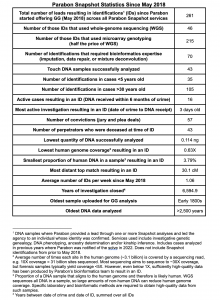Parabon Sees Trend in Active Casework Use of Investigative Genetic Genealogy (IGG)
Could IGG Make the Term "Cold Case" Obsolete?
RESTON, VIRGINIA, UNITED STATES, February 15, 2023 /EINPresswire.com/ -- Whether the motivation for the crime was love, lust, looting or loathing, Parabon’s investigative genetic genealogy (IGG) service has transformed the way violent criminal cases are investigated. To date, Parabon’s Snapshot® Advanced DNA Analysis Services (“Snapshot”) (1), which includes IGG, has helped law enforcement agencies throughout the United States and Canada make positive identifications in over 260 cases — averaging approximately one per week since the IGG service was first offered in May 2018. Parabon’s annual casework update for 2022 is provided in Table 1.
Beginning in 2018, law enforcement agencies throughout the United States and Canada have routinely made announcements about decades-old cold cases being resolved with a lead generated by Parabon. During this same time, IGG advocates and journalists throughout the world speculated that IGG would also change the landscape of active criminal investigations - and they were right. When asked about the landscape today, Parabon’s Chief Genetic Genealogist, CeCe Moore said “The evidence is indisputable. There is no longer any reason for violent criminal cases with DNA evidence to go cold.”
The very first active investigation to use IGG, was a 2018 sexual assault case of an elderly woman in St. George, Utah that occurred only three weeks prior to Parabon becoming involved in the case (2). The crime was committed in April and the agency sent the DNA sample to Parabon in May. By July the police had finished its investigation into the leads provided by Parabon, matched the crime scene DNA to the person-of-interest, arrested him and obtained a confession. The offender entered a plea deal and was sentenced to serve a minimum of six years in the Utah State Prison where he is currently carrying out his sentence. This was the first time that a suspect identified through IGG in an active investigation was identified and convicted of a crime. “The St. George case is a good example of how extremely powerful investigative genetic genealogy can be and the significant impact it can have on improving public safety by stopping would-be serial offenders in their tracks and saving lives, as well as conserving public resources.” Moore stated. Since that time, Parabon has helped close 15 additional active investigations (3), including one where the DNA sample was received by Parabon only three days after the crime was committed.
“Because Parabon’s Snapshot division has been so successful in helping law enforcement agencies solve hundreds of cold cases, agencies are now turning to us regularly for active investigations, so that cases don’t go cold in the first place.” said Ellen Greytak, PhD, Parabon’s Director of Bioinformatics and the Snapshot Division Technical Leader. In addition to using IGG for the first time on an active criminal investigation, Moore’s work at Parabon has led to the first conviction, the first conviction through jury verdict, and the first exoneration in cases where the suspect was identified through IGG. Parabon and its customers also made the first identification of a violent offender in Canada via a lead generated through IGG in 2018. Prior to offering IGG, Parabon used its Snapshot DNA phenotyping and kinship inference technologies for lead generation purposes, and those technologies resulted in several additional identifications and convictions.
Out of the hundreds of cases with positive identifications, over 130 involved living violent offenders. Many of those cases are still going through the prosecution process, but so far 57 have resulted in conviction. Many of the convictions are from plea deals, but 19 convictions were obtained via bench/jury trial. “It might seem ambitious, but I’d like to think we can help make the term “cold case” eventually become obsolete”, said Moore.
---- Footnotes
(1) The Snapshot division consists of IGG and other services that are complementary to IGG that either enable or inform the IGG work, including specialized DNA processing, such as whole genome sequencing and genotyping, advanced bioinformatics, DNA phenotyping (i.e., trait prediction) and kinship inference.
(2) https://abc.com/shows/the-genetic-detective/episode-guide/season-01/06-the-hot-case
(3) In this context an active investigation is defined as DNA received by Parabon within 6 months of the crime.
Paula Armentrout
Parabon NanoLabs, Inc.
+1 703-689-9689 ext. 250
media@parabon.com
Legal Disclaimer:
EIN Presswire provides this news content "as is" without warranty of any kind. We do not accept any responsibility or liability for the accuracy, content, images, videos, licenses, completeness, legality, or reliability of the information contained in this article. If you have any complaints or copyright issues related to this article, kindly contact the author above.

